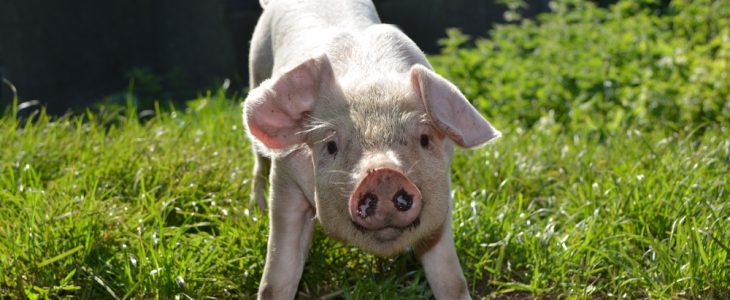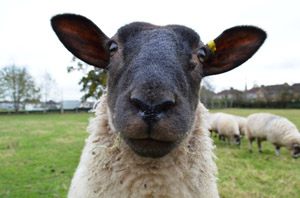As a small working farm, we produce a range of fruit, vegetables, eggs and meat products.
One of our aims is to ensure that our approach to animal welfare aligns with the highest industry standards. Because we are a very small farm, we do not hold formal accreditation for animal welfare, so we have summarised our how we do that here.
All our animals
We actively aim to let our animals live in the most natural way possible, and only intervene where there is a health issues that we need to help with.
Our animals are kept in such a way that encourages their natural behaviours and offers them enrichment. We make sure that they have fresh water daily, and that they are fed a varied, appropriate diet. They are checked daily for any signs of ill health and we only use medicines or antibiotics when they are required, under the instructions of a vet. We aim to minimise stress on our animals and adhere to the five freedoms as set out by the RSPCA.
Our cattle
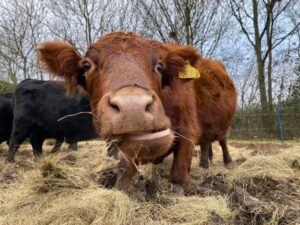 We have a small herd native breed beef cattle which are well adapted for living on our farm. We operate a very ‘hands off’ system, they are free to live in their family group and express their natural behaviours. Our fields are large and include areas where the cattle can shelter from the sun and the rain, scratch themselves on the trees and eat a wide variety of grasses, leaves and plants. None of our pastures are treated with any artificial fertiliser or pesticide.
We have a small herd native breed beef cattle which are well adapted for living on our farm. We operate a very ‘hands off’ system, they are free to live in their family group and express their natural behaviours. Our fields are large and include areas where the cattle can shelter from the sun and the rain, scratch themselves on the trees and eat a wide variety of grasses, leaves and plants. None of our pastures are treated with any artificial fertiliser or pesticide.
We naturally wean our calves which means that when the mothers need to focus on creating milk for their next calves they will, naturally chase the older ones away. We generally only separate our group when it is in the animals’ best interest to do so.
Our chickens
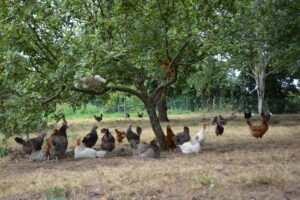 Our chickens are free range and kept for eggs, they have access to the outdoors during daylight hours and are locked away overnight to protect them from predators. They have a large run where they can express their natural behaviours, move around freely, scratch, peck, and dustbathe. They have shelter in their runs and trees which they can perch in. We keep our chickens for as long as they are commercially viable after which we re-home them to local people.
Our chickens are free range and kept for eggs, they have access to the outdoors during daylight hours and are locked away overnight to protect them from predators. They have a large run where they can express their natural behaviours, move around freely, scratch, peck, and dustbathe. They have shelter in their runs and trees which they can perch in. We keep our chickens for as long as they are commercially viable after which we re-home them to local people.
Our pigs
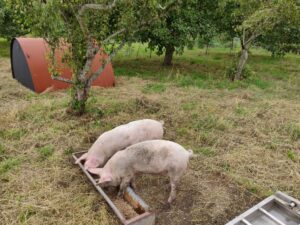 All of our pigs are kept with access to the outdoors. This will generally be with access to a field pen wherever conditions allow. We occasionally breed our own piglets, when we do this we keep intervention to a minimum. We do not subject our piglets to tail docking, teeth pulling or castration. They are weaned at 8 weeks when generally the sow has had enough of them!
All of our pigs are kept with access to the outdoors. This will generally be with access to a field pen wherever conditions allow. We occasionally breed our own piglets, when we do this we keep intervention to a minimum. We do not subject our piglets to tail docking, teeth pulling or castration. They are weaned at 8 weeks when generally the sow has had enough of them!
Our sheep
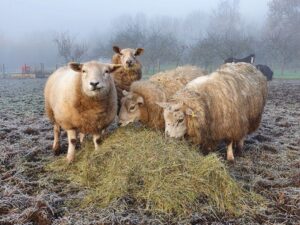 We breed just a few sheep each year and support other farmers by adopting orphaned lambs that have either been rejected by their mothers, become unwell or separated, or the ewe has died. We take them on and bottle feed them until they are strong enough and able to fend for themselves. They are kept in a warm, clean pen initially, then gradually introduced to the outdoors as they get older and stronger.
We breed just a few sheep each year and support other farmers by adopting orphaned lambs that have either been rejected by their mothers, become unwell or separated, or the ewe has died. We take them on and bottle feed them until they are strong enough and able to fend for themselves. They are kept in a warm, clean pen initially, then gradually introduced to the outdoors as they get older and stronger.
